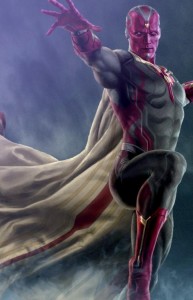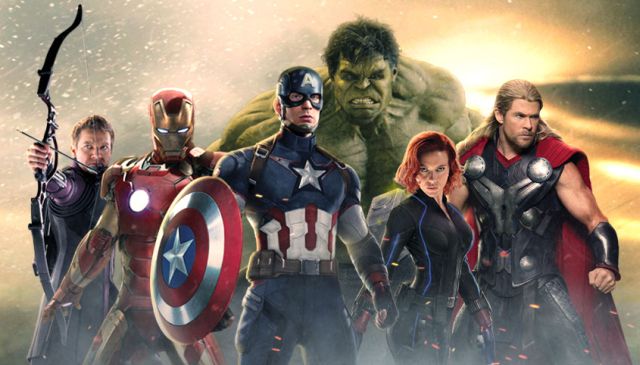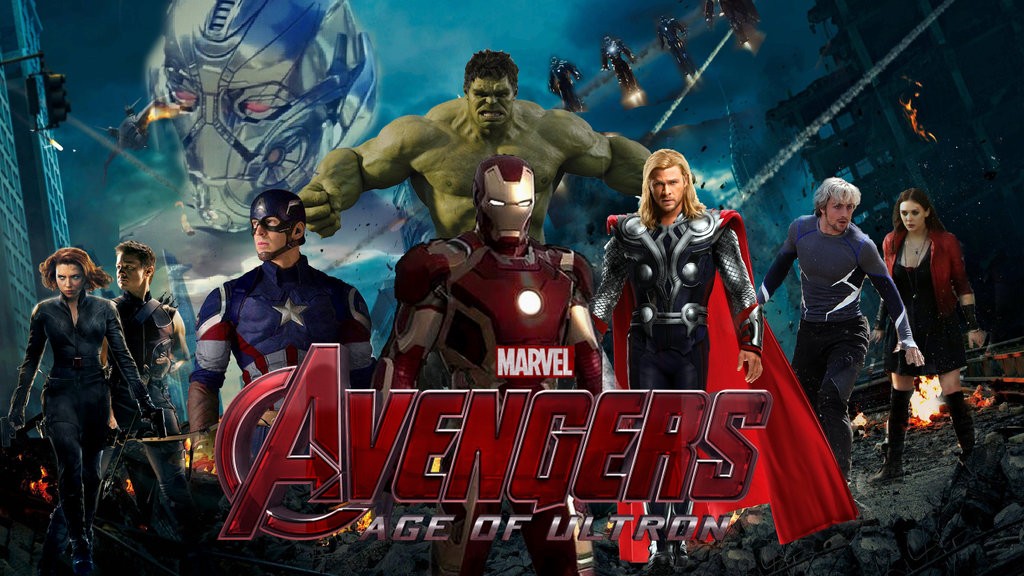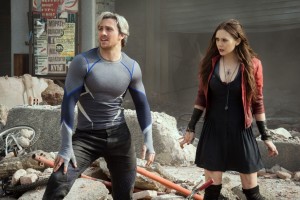The Avengers: Age of Ultron is every bit the entertaining superhero spectacle we’ve come to expect from Marvel Studios. While not without some plot and pacing problems, it delivers a truly grand finale to “Phase Two” of the Marvel Cinematic Universe, and left me eager to see the adventures of newly assembled Avengers.
A Fantastic Frankenstein Film. Mary Shelley’s tale of the mad scientist trying to play God is almost two centuries old, but it feels fresh here, transposed into a high-tech, superheroic key. Tony and Bruce’s decision to activate Ultron happens too fast to be fully convincing, but the resulting monster is such an engrossing onscreen presence, it’s just as well we get to him as quickly as we do. Ultron is a captivating embodiment of our society’s ambivalent relationship to technology: Even as we crave more and more tech, even as we allow and encourage it to proliferate like Ultron’s army of robotic minions, we fear what it might do—or, more accurately, what we might do to ourselves through it. While by no means a “message movie,” Age of Ultron could encourage us to slow down and anticipate solutions to the unintended challenges our rapidly changing technology creates.
A Little Sloppy, But Still Satisfying. Age of Ultron doesn’t flow as smoothly as The Avengers did. It doesn’t quite feel like a unified whole. Too many seams still show. Pietro and Wanda Maximoff, pivotal though they are to the plot, never fully develop; the script relies too much on straightforward exposition to establish their personalities and motives. A well-crafted flashback sequence would have been more powerful. The movie’s second act contains some important thematic material, but a subplot involving Thor’s vision is nearly incomprehensible without previous knowledge of Marvel Comics lore. Fortunately, that thread doesn’t last long, and doesn’t make much short-term difference (although it sets up more Marvel movies to come).
The third act, however, more than makes up for any flaws in the first two. The final fight against Ultron hits some predictable blockbuster beats, but it hits them with style, some flashes of genuine humor, and a lot of heart. Pietro’s death caught me off guard—even though Cap warned us not everyone would walk away from the battle—and I found the “eucatastrophic” arrival of War Machine, Falcon and the S.H.I.E.L.D. helicarrier an exhilarating highlight. The film might have benefitted from a little more polishing, but I left the theater thoroughly satisfied and entertained.
Heroes Acting Like Heroes. What I appreciate most about Age of Ultron is its unabashed faith in heroism. These characters aren’t perfect (a fact that makes the marble statue of them in the background of the end credits more than a little ironic), but they are idealistic and hold themselves to the highest possible standards. Their overarching commitment to doing what’s right shines through most clearly in their repeated efforts, in every major action sequence, to spare innocent lives. At the beginning, Tony Stark’s “Iron Legion” warns Sokovian civilians to stay back from a battle zone. In the middle, Tony doesn’t drop the Hulk until he finds an empty building on which to drop him. At the end, the Avengers’ refusal to give up on evacuating an entire city’s population drives most of the drama. You don’t have to leave this movie feeling the need to make excuses for the heroes’ behavior. These are characters it feels good to root for. (I hope the Batman v Superman: Dawn of Justice creative team is taking notes.)
 Doomed but Beautiful? I am eager to learn more about The Vision. Based on his characterization in Age of Ultron, he is a Marvel android analogue of Superman. As a Superman fan, I’m intrigued. But where Superman never gives up hope for humanity’s future, The Vision agrees with Ultron’s long-term forecast for our species: “They are doomed.” For The Vision, however, this is not cause for despair, but reason to rejoice in the moment: something is not made beautiful simply by lasting.
Doomed but Beautiful? I am eager to learn more about The Vision. Based on his characterization in Age of Ultron, he is a Marvel android analogue of Superman. As a Superman fan, I’m intrigued. But where Superman never gives up hope for humanity’s future, The Vision agrees with Ultron’s long-term forecast for our species: “They are doomed.” For The Vision, however, this is not cause for despair, but reason to rejoice in the moment: something is not made beautiful simply by lasting.
I’m still sitting with and processing that moment. Intellectually, I know nothing lasts forever, a point made multiple times in the movie. Theologically, I confess only God is immortal (1 Timothy 6.16). There is wisdom in seeking and celebrating what is beautiful about our fleeting existence—in enjoying ourselves, eating and drinking and taking pleasure in our toil (Ecclesiastes 3.12-13), in thinking about whatever is true, honorable, just, pure and commendable (Philippians 4.8). But is being mortal the same as being “doomed?” How do we, as Christians, find ways to affirm and even fight for our own and our species’ span, finite though they are, while also affirming that God is even now redeeming not only the human race but the whole creation, preparing a new heaven and earth that will never pass away?
I don’t have complete answers yet, but I wasn’t expecting the summer’s first big popcorn flick to leave me asking such a big question! For that, as well as for the thrills it delivers and the simple movie-going pleasure it brings, I give Age of Ultron an enthusiastic recommendation.
What did you think of The Avengers: Age of Ultron?




The big-question line that I kept thinking about was Cap’s emphatic, “Every time someone tries to prevent a war before it happens innocent people die.”
Thanks for mentioning that line, John – it struck me, too. Do you think Cap is right? I’d hate to think we can only ever be reactive where war is concerned. Is Cap talking only about “pre-emptive” military force, or does his statement include trying to prevent war through negotation and diplomacy? (The repeated use, at least twice that I caught, of “peace in our time,” which can’t help but bring Neville Chamberlain to mind…. Is Tony Stark really using those words without irony to describe what he designed Ultron to do?)